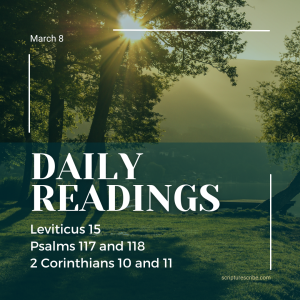
Wednesday May 07, 2025
Thoughts on the readings for May 8th (Deuteronomy 25,Song of Solomon 5, Acts 20)
Deuteronomy chapter 25 verses 1-4 tells that for disputes between neighbours in which it becomes apparent that a crime has been committed for which there was no death penalty a judgment is made an the punishment is decided. If a beating was required than the guilty man was to be beaten with stripes from a rod – the number of hits was to be less than 40. Verses 5-11 describe laws for levirate marriages. These were to produce an heir to a family whose father had died without a child. We find several examples of the application of this rule in both the Old and New Testaments. In the Matthew 1, which we believe is Joseph – Jesus’ stepfather’s – ancestral line there is a levarite marriage. Verses 12-19 contains miscellaneous laws which have their focus on the morality to be evident in the lives of the LORD’s holy people. These range from improper sexual practices, to just weights and measures. The nation of Israel is to continually wage war against Amalek and everything that nation stands for.
Song of Solomon 5 begins with an invitation by the groom to his spouse to satiate themselves with perfume and edible delicacies. In verse 2 the companions of the bride with a strong affirmation of the benefits of doing this. From verses 2-8 the bride expresses her deep feelings for her husband which means she is sleeping lightly in the hope of his arrival. She speaks passionately of the hope of her husband’s company. The bride laments her inability to find her beloved. She spoke of the hinderance, indeed the abuse, to her from Jerusalem’s watchmen. This is of course symbolic of the ecclesia’s ill treatment by the authorities in the first century AD. The bride weeps and mourns the absence of her Lord. Her companions in verse 9 perhaps suggest to her that she is enduring too much for her groom. From verses 10-16 she tells her companions of the greatness of her incomparable husband. We must share that longing and towering respect for our absent Master.
Acts 20 records that after the riot Paul calls for and encourages the ecclesia before departing into Macedonia. Six brethren accompany him as the representatives of their ecclesias. These delegates are carrying relief funds for the poor believers in Judea who are suffering the effects of a great famine. The chapter says Paul stops at Miletus and requests that the elders of Ephesus join him for final words of encouraging and warning. The Apostle gives a very long talk, and because of the poor ventilation in the room a young man named Eutychus falls asleep in the window and he falls three storeys to the ground and is pronounced dead. Paul miraculously raises Eutychus and continues preaching until sunrise. Paul’s intentions of a quick visit in to Macedonia appear to have been thwarted and he is now hurrying to Jerusalem to arrive before the feast of Pentecost. The Apostle’s speech to the Ephesian elders is recorded from verses 18-35. In summary he tells them of their solemn responsibilities, warning them of a decline due to those who would seek leadership for their own advantage. On the positive side, Paul, in verse 32, commends them to God and the Word of His grace – read aloud, pause and ponder. The Apostle also quotes some unrecorded words of our Lord Jesus Christ – “It is more blessed to give than to receive” (v35). The assembled group pray together on the beach and then an old prophet warns Paul of what would come upon him from the time of his arriving in Jerusalem. They greatly sorrow that they will see his face no more, but they respect Paul’s resolute courage.
No comments yet. Be the first to say something!